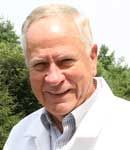LCGC Announces the 2018 Winners of the Lifetime Achievement and Emerging Leader in Chromatography Awards
LCGC, the leading resource for separation scientists, is proud to announce that Ronald E. Majors and Zachary S. Breitbach are the winners of the 11th annual LCGC Lifetime Achievement and Emerging Leader in Chromatography Awards, respectively. Majors and Breitbach will be honored in a symposium as part of the technical program at the Pittcon 2018 conference in Orlando, Florida, on February 26, 2018.
LCGC, the leading resource for separation scientists, is proud to announce that Ronald E. Majors and Zachary S. Breitbach are the winners of the 11th annual LCGC Lifetime Achievement and Emerging Leader in Chromatography Awards, respectively. Majors and Breitbach will be honored in a symposium as part of the technical program at the Pittcon 2018 conference in Orlando, Florida, on February 26, 2018.
The Lifetime Achievement Award
The Lifetime Achievement in Chromatography Award honors a seasoned professional for a lifetime of contributions to the advancement of chromatographic techniques and applications.

Ron Majors, the 2018 winner, earned a PhD in analytical chemistry in 1968 at Purdue University, under the direction of L.B. (Buck) Rogers in the area of molecularly imprinted phases. He started his postgraduate career at Celanese Research Company as a supervisor of the separations laboratory and moved to Varian Associates in 1971. Early in his career at Varian, Majors published his pioneering work on the successful packing of microparticulate (5-µm) high performance liquid chromatography (HPLC) columns and studies on the effect of particle size distribution. In fact, he was the first to efficiently pack and commercialize a 5-µm HPLC column.
In 1987, Majors moved to EM Science in New Jersey as the general manager for chromatography products. Three years later, Majors moved to Hewlett-Packard in Wilmington, Delaware, which later became Agilent Technologies. In his 23 years there, he held positions as a product marketing manager, business development manager, product marketing specialist, and senior chemist. For many years, he served on the executive staff of the Columns and Supplies Division as a technical advisor to the general manager while providing support for columns and sample preparation products on a worldwide basis. This work entailed extensive worldwide travel to present seminars and training at conferences, customer sites, and Agilent events.
Majors has over 250 publications on chromatography, sample preparation, and surface chemistry. Majors had an enormous impact on the separations community through his monthly LCGC magazine columns, “Column Watch” and “Sample Preparation Perspectives.” During his 33 years as an LCGC columnist, Majors educated and provided guidance to a couple of generations of practicing chromatographers worldwide.
Majors has been an invited lecturer and session organizer at many national and international symposia, and for many years, was the Poster Committee Chair for the HPLC series of meetings. He chaired the HPLC ’86 meeting, which was the largest ever. His lectures have drawn large crowds all over in the world.
Majors has been active in the American Chemical Society’s Subdivision on Chromatography and Separations Chemistry, the Delaware Valley Chromatography Forum-where he is currently president-and the California Separations Society (CASSS). He also serves on the editorial board of LCGC and served as a member of the Instrumentation Advisory Board of Analytical Chemistry.
He has received numerous awards, including the Merit Award in Chromatography from the Chicago Chromatography Discussion Group, the award for Distinguished Contribution in Separation Science sponsored by CASSS, the “Salutes to Excellence” award from the North Jersey Chromatography Discussion Group, the Palmer Award from the Minnesota Chromatography Forum, and the Martin Gold Medal from the Chromatographic Society of the UK.
The Emerging Leader Award
The Emerging Leader in Chromatography Award recognizes the achievements and aspirations of a talented young separation scientist who has made strides early in his or her career toward the advancement of chromatographic techniques and applications.

Zachary S. Breitbach, the 2018 winner, received his PhD in 2010 from the University of Texas at Arlington (UTA). Subsequently, he worked as a research scientist at UTA while simultaneously aiding in the launch of AZYP Separations and Analytics. Currently, he is a senior scientist at AbbVie.
Breitbach has already made important contributions to both HPLC and gas chromatography (GC). In GC, Zach Breitbach played a fundamental role in the development, synthesis, characterization, and utilization of highly thermally stable, high viscosity ionic liquids as new GC stationary phases. Two of the ionic liquids he developed were subsequently commercialized. In HPLC, his work covers enantiomeric separations, hydrophilic interaction chromatography (HILIC), ultrafast and high efficiency separations, supercritical and subcritical fluid separations, core–shell bonded phases, and interfacing HPLC to paired ion electrospray ionization (PIESI) mass spectrometry. Breitbach formulated the theory and described the fundamental processes to explain the capabilities and limits of both HILIC and chiral stationary phases made with superficially porous particles (SPPs). His work on these phases led directly to ultrafast chiral and HILIC separations. He also extended this work to supercritical fluid chromatography (SFC).
Breitbach has more than 70 peer-reviewed papers published with 1700 citations and has an H-index of 22; he has four papers with well over 100 citations each. He has given 35 invited lectures at national or international meetings, universities, and companies. Additionally, he has over 100 other poster and coauthored oral presentations. He also holds three patents.
Visit the LCGC website or information about past LCGC award winners or for information on how to nominate a candidatefor a future award.
Study Examines Impact of Zwitterionic Liquid Structures on Volatile Carboxylic Acid Separation in GC
March 28th 2025Iowa State University researchers evaluated imidazolium-based ZILs with sulfonate and triflimide anions to understand the influence of ZILs’ chemical structures on polar analyte separation.
Study Explores Thin-Film Extraction of Biogenic Amines via HPLC-MS/MS
March 27th 2025Scientists from Tabriz University and the University of Tabriz explored cellulose acetate-UiO-66-COOH as an affordable coating sorbent for thin film extraction of biogenic amines from cheese and alcohol-free beverages using HPLC-MS/MS.
Quantifying Microplastics in Meconium Samples Using Pyrolysis–GC-MS
March 26th 2025Using pyrolysis-gas chromatography and mass spectrometry, scientists from Fudan University and the Putuo District Center for Disease Control and Prevention detected and quantified microplastics in newborn stool samples.








